I went outside and smoked a cigarette, looking this way and that, the very picture of an American idler in Mexico, right down to the grass-green golfing trousers. They had looked all right on the old man from Dallas but they made me feel like a clown. They were hot and sticky, too, made of some petroleum-based fiber, with hardly any cotton content. The town was quiet, no street cries, very little traffic. Christmas is subdued in Mérida. Easter is the big festival. Holy week, when all the fasting and penitence is coming to an end, I could sense nothing in the air. Art and Mike had told me that something was stirring. What? Just something—coming. They couldn’t say what. We would see. It was old President Diaz who said that nothing ever happens in Mexico until it happens. Things rock along from day to day, and then all at once you are caught up in a rush of unforeseen events. — Charles Portis, Gringos
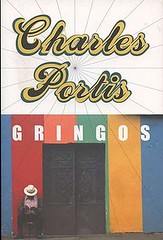 Gringos
Gringos
Charles Portis
![]()
I’ve now read every Charles Portis novel there is to read. Portis, like Patrick O’Brian, is an author to be read again and again, but it’s still sad there isn’t anything new for his fans.
In an earlier review of Portis’ The Dog of the South, I said this:
“I read elsewhere that The Dog of the South is part of a trilogy, with Masters of Atlantis and Gringos. I read Masters last year; now that I’ve read Dog of the South I see the theme that ties them together, a search for meaning in the superficial Americana of small-time grifters, oddball misfits, and seekers after truth.”
While this is certainly true of Gringos, there’s a bona fide Mens’ Life-style jungle adventure in this novel as well, one with suspense, thrills, murder, and a satisfyingly exciting resolution, and this makes Gringos more like True Grit than Portis’ other novels. Which is not to say Jimmy Burns would not have fit into the narrative of any of the other novels: a man of action yet quintessentially Portisian, an exiled drifter who takes things as they come, a keen observer of the people around him but blind to certain things that are obvious to the reader (his pursuer Louise, for instance). As always with Portis, an abundance of shrewd humor accompanies the action in Gringos.
Another reviewer described Portis’ characters as lacking in depth. Compared to what other author’s characters? Unless we’re talking about Elmore Leonard or Jane Austen, I couldn’t disagree more. When it comes to depth, I’d put Jimmy Burns, Refugio, or even Refugio’s dog Ramos up against almost any character in popular fiction today. Do not dis Charles Portis in my presence, anonymous reviewers!
I pray Charles Portis has one or two more novels in the works, and that he will live to publish them. There isn’t enough Portis in the world.
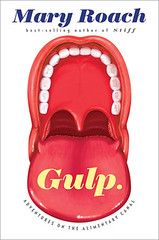 Gulp: Adventures on the Alimentary Canal
Gulp: Adventures on the Alimentary Canal
Mary Roach
![]()
I love Mary Roach’s sense of humor. Here’s a sample to whet your appetite, from a footnote on page 67:
“Compulsive hair-eaters wind up with trichobezoars—human hairballs. The biggest ones extend from stomach into intestine and look like otters or big hairy turds and require removal by stunned surgeons who run for their cameras and publish the pictures in medical journal articles about ‘Rapunzel syndrome.’ Bonus points for reading this footnote on April 27, National Hairball Awareness Day.”
She’s smart, playful, and curious. There’s not a squeamish bone in her body. And she can write. In Gulp, she explores the human alimentary canal, from lips to anus and everything between. When you finish reading you will agree with her conclusion: we are not much more than digestive systems on legs, tubes with brains. You’ll be a lot less full of yourself, and more interested in what’s going on inside when you’re full of food.
Other Goodreads reviewers have noted that this is a book best read in small doses. Yes. Some of Mary Roach’s signature punchlines … pointing out that a gastrointestinal researcher’s last name is Crapo, for example … are childish, and if you were to read several chapters at one sitting, possibly grating. Funny as hell, because we’re all children when it comes to poop humor, but still. I read no more than one chapter at a sitting, and found myself laughing out loud every time Mary pulled this trick.
Did I mention I love Mary Roach’s sense of humor? I think I love Mary Roach, period.
Can’t wait for her next one!
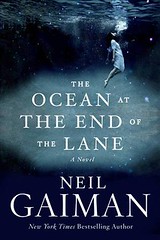 The Ocean at the End of the Lane
The Ocean at the End of the Lane
Neil Gaiman
![]()
My overall reaction is disappointment. I’ve read other Gaiman fantasies and enjoyed them, and while this one is as readable as the others, it doesn’t mean anything, doesn’t relate to anything we know in life. In American Gods, at least we learned something about the old gods different tribes brought to the new world, so our sense of wonder was tied to something real … not that the old gods were real, but that men once believed in them. Here, the gods, or whatever they are, are so outside the scope of anything men have ever imagined, and are so historically non-existent, that I felt Gaiman was merely playing out a mental exercise on readers: look what I can come up with; your imagination is in no way equal to mine.
Gaiman’s storytelling IMO has grown lazy. Example: asking us to believe, with no buildup or explanation, that within minutes of meeting Lettie for the first time his seven-year-old character cottons to the fact that Lettie’s a supernatural being, far older than she seems. Surely the child’s dawning awareness of Lettie’s true nature would have been worth a few pages, no? It’s almost as if Gaiman is writing in shorthand, giving us bullet lists of fantasy tropes rather than paragraphs or chapters. In Lindqvist’s Let the Right One In, it takes Oskar several chapters to come to the realization that Eli isn’t really twelve, another few chapters to realize she’s a vampire. Lettie is a physical manifestation of a pan-universal intelligence that pre-dates the Big Bang, bigger and older than matter itself for goodness’ sake, and the kid figures it out instantly?
And then there’s this: the novel is shockingly short, and I’m annoyed I had to pay such a high price to read it.
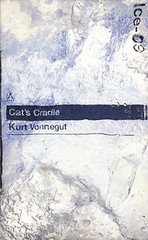 Cat’s Cradle
Cat’s Cradle
Kurt Vonnegut
![]()
I was happy when my book club selected Cat’s Cradle as a monthly read. I read all of Vonnegut when I was younger and recently re-read Slaughterhouse-Five as part of my banned book project. I always loved Vonnegut’s common sense outlook and avuncular writing style. He spoke directly to me; reading Vonnegut was like spending time with a close friend. None of that has changed.
I remembered Bokononism and the terrifying Ice-Nine, but not the name of the novel where the concepts were introduced, so I experienced a “eureka” moment when I realized Cat’s Cradle was that very story. When I was younger, Bokononism seemed to me as sensible as any other religion, more sensible than most, but I remember being a little put off by the silly words Vonnegut invented for Bokononist principles and concepts: the wampeters, karasses, granfaloons, and such. This time around my negative reaction to these silly words was stronger. The silly names came across as baby-talk, as did Vonnegut’s attempts to create an islander dialect … I was embarrassed to read those passages, and felt they undermined Vonnegut’s finest idea, the humble religion of Bokonon, where man knows his place in the universe and doesn’t take himself so seriously.
Kurt Vonnegut is still my favorite literary uncle. He still speaks to me. But I’m a little less patient today than I was then, and the minor flaws bothered me more than in the past. Still, I embrace the opportunity to re-read Vonnegut. Next on my re-read list: God Bless You, Mr. Rosewater.
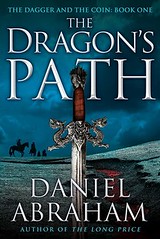 The Dragon’s Path (The Dagger and the Coin #1)
The Dragon’s Path (The Dagger and the Coin #1)
Daniel Abraham
![]()
This was an added novel included with the B&N Nook edition of Leviathan Wakes by James S.A. Corey. Turns out Corey is one of Daniel Abraham’s pen names, or maybe it’s the other way around. At any rate, same author. Leviathan is science fiction; Dragon’s Path is historical fantasy. Very good historical fantasy, I’m happy to say, and the first of a planned series.
The landscape, the cities, the descriptions of commerce and society, and the hints of what was once a more advanced and magical world (with dragons, yet) are detailed and intriguing; so is the author’s conceit of a humanity that has split into distinct species, some of which can interbreed. The characters, at least the primary ones, are well drawn and believable.
I’m very much reminded of George R.R. Martin’s Game of Thrones series, and in a good way. If you can’t get enough of GOT and have finished all the books GRRM has written to date, Abraham’s work will give you reason to keep living and reading. The scale of the story here doesn’t appear to be as grand and sweeping as that of GOT, but is similar enough (without being a cheap copy by any means) that fans will feel right at home. And I could well be wrong about the scale … this is just the first of several planned installments.
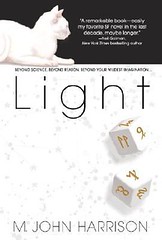 Light
Light
M. John Harrison
![]()
Light might be a handful for a new science fiction reader or someone anticipating a cyberpunk near-future story à la William Gibson (I only mention that because Goodreads catalogs Light as cyberpunk sci-fi). If you’re a longtime reader of hard sci-fi, though, you won’t have any problem grokking Harrison’s vision.
Two timelines run simultaneously in Light: the late 1990s, when a two-man team, with an assist from an alien intelligence (though they don’t know that) discovers the singularity of everything, leading to practical spaceflight beyond the solar system; the 2400s, when human and alien actors elsewhere in the galaxy begin to encounter the limits of their knowledge. In Harrison’s universe, divergent laws of physics co-exist, including some that have been lost and are about to be re-discovered.
Harrison’s characters are unsympathetic and demanding. One of the 20th century scientists is a serial killer. The two primary characters of the 25th century are deeply damaged, one so much that she has given up her corporeal body to become the organic/electronic brain of a sentient spaceship, while the other spends most of his life inside a sensory tank, fleeing reality. Along the way you’ll meet a host of colorful scoundrels, genetically modified humans, and not a few aliens. And then there’s the Shrander. I haven’t had a Shrander nightmare yet, but I know it’s coming.
The writing is first rate. Everything feels immediate and real, and Harrison conveys the sense of wonder quantum physics should awaken in anyone who is paying attention. The two timelines, of course, are intertwined. I saw several connections but missed others, and when Harrison began to to tie everything together toward the climax of the novel, I experienced some great “a-ha!” moments.
Light is a terrific read for any “hard” sic-fi fan, but as I mentioned at the top, it might frustrate readers new to the genre … there’s some entertaining space opera in it, but it’s much more than that. I want more.